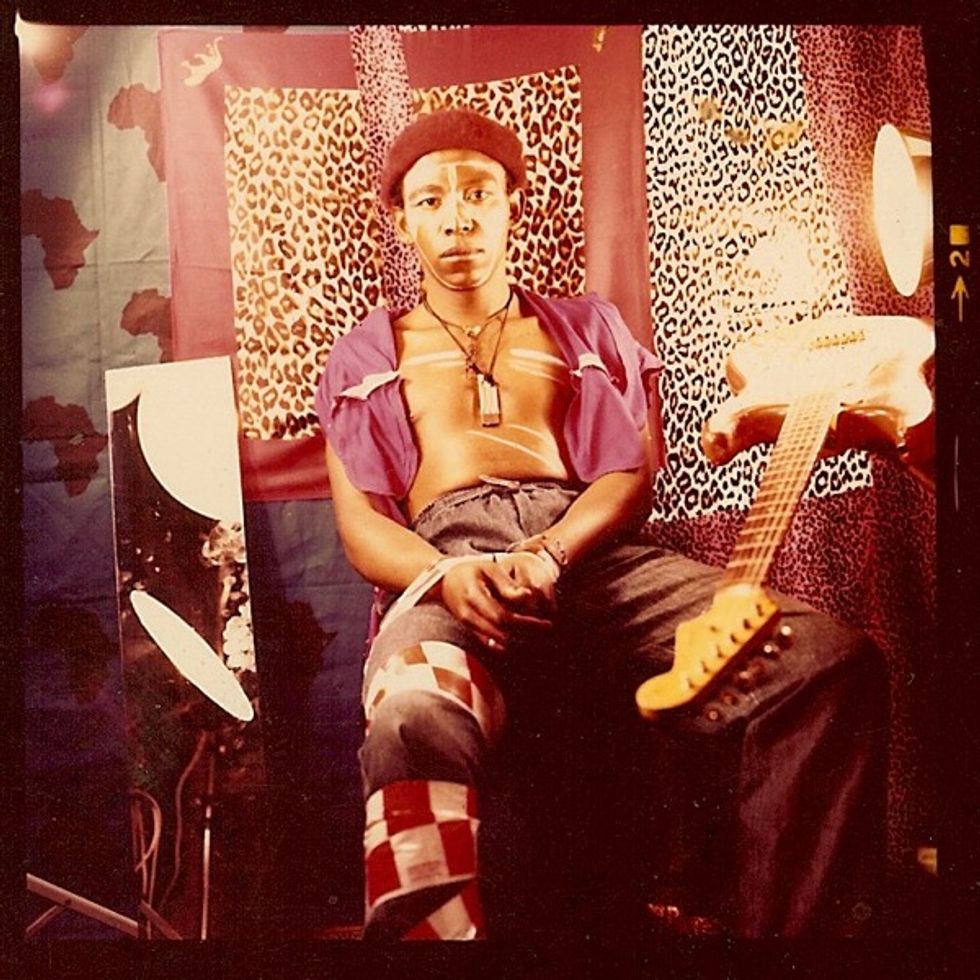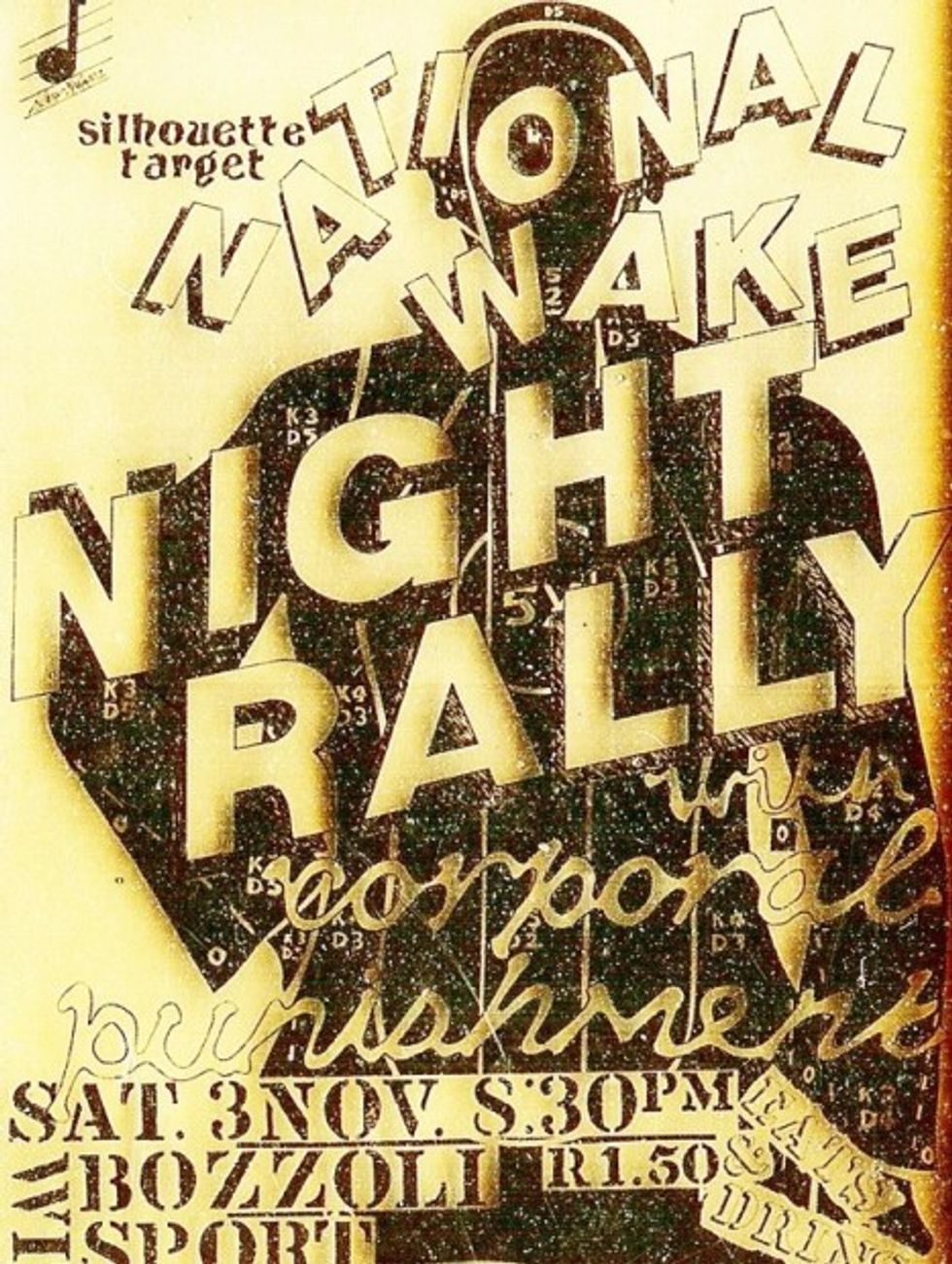1980s Jo'burg Punk From 'National Wake'
An in-depth look at late 1970s/early 1980s mixed-race Johannesburg punk band National Wake's only album, which has now been re-issued.

That said, if you were to draw a line from the Minutemen to King Sunny Ade to Sandinista-era Clash, it might be roughly the shape of the album's introductory song, “Wake of the Nation” in which the first sense of the word is hoped for and the second is feared. Draw another from early Talking Heads to The Jam and back to Ladysmith Black Mambazo and you might draw an approximate silhouette of “Dreams in My Head.”
“International News” has the gritty 50s hip-swiveling swing of The Cramps, with its concerns for post-Soweto uprising propaganda and censorship. The Soweto Uprising had taken place only two years before the band started, and it gives the grease monkey vibe a more urgent taste. The backbeat-dragging “Bolina” has high-end drum sounds a contemporary EDM artist or DJ would find tempting to make off with and soulful Jamaican-style vocals with a thick South African accent; its guitars steely as a track from Gang of Four's Entertainment. “Kalabash” rocks in the same funky psychedelic waters that knocked P-Funk's boats together and “Supaman” reaches with the striving of a Desmond Dekker ska song. “I keep on moving, like a working man. I keep on fighting, like a supaman.”
“Time and Place” impossibly creates a sound tinny and velvety at the same time. Sounding somehow indescribably LA, somewhere between Rank and File and Green on Red, they nevertheless could not be talking about any place but theirs, no time but that time. “When a man joins a race, I think it's the time, I know it's the place.” (Give me a lever long enough and a place to stand and I can move the world.) They slow it down for “Student Life,” evoking Bowie, The Specials and Joe Jackson without ever letting go of a distinctly African rhythmic geometry. “Xighangu Xamina” is a cloud with a sense of velocity only found in dreams. “Stratocaster” is more of a trad rock song than most on the album, with a swinging guitar line that impossibly fuses an African and a southern rock sensibility. However, it and “Mercenaries” were both cut from the album out of the record company's fear of the album getting banned.
Speaking of which, “Mercenaries” has the same fuzzy urgency of big UK punk bands — Sex Pistols, Clash, Stiff Little Fingers — but more involved and with a higher bounce. Mercenaries are, to this day, an issue in Africa. Take a plane somewhere and try not to run into one. Setiously. Try not to. They are scary as shit. “Black Punk Rockers” combines the roar of punk, the collage of art rock and the voice of Africa into something that has not aged a day since it was recorded. A live track that was added to the reissue — and for good reason — it remains eternally aggressive, transgressive and transportive. Finally, with “Walk in Africa” National Wake growls its way out across a musical landscape of enormous skies into an ellipsis unresolved three decades later.
National Wake is a success as an album, not just as a collection of songs. That used to be a part of recording, taking the listener on a journey through a landscape built out of the individual songs, built in turn out of the individual instruments and the memories of the men and women behind them. Every musical moment becomes a movement and every movement a genre and every genre calcifies. Just look at the wildly loose Delta blues, how it became the mechanized Chicago blues and, eventually, devolved into a million white-guy blues bands that scarred an entire generation of college students, leaving them shaky and sweating nauseously every time I-III-V chords repeat in nature or on the radio. Punk similarly devolved into hardcore, then ghastly East Coast meathead music and has now fallen flat.
National Wake reminds those of us who were there, and educates those who were not, that punk rock meant — yeah, OK — fast rather than slow, now rather than later, but it also meant all the doors in the house were kicked open, kicked off their hinges in fact, and “no” was not a word that had any place in music. If you loved it, you played it, you mixed it in, you drew from it. It inspired you.
Flyer by Wilhem Hahn.
In the U.S., early punks loved hip-hop, in the U.K. they loved reggae, and in South Africa they loved the varied musics of that continent, as well. This isn't “local color,” something quaint. It was something in the air. And because they loved it, and because it made them, it helped form what punk was for them, it didn't just season the music — it wasn't a spice, it was the meat in the stew — it helped define it. All punk rock was the same and no punk rock was like any other.
If you want a sense of what punk can be, rather than the prêt-à-porter commodity it became, this album will act as a harsh corrective to the Vans Warped Tour and other corporate carnivals that have zombied the corpse of punk, or hell if you just want a sense of what music is capable of, a non-discriminatory sonic and spiritual coupling, National Wake will work.
At the risk of going straight over the top, here's the thing. National Wake isn't so much a record as a ceremony. It reminds one of Passover, or any other ritual whose purpose is to keep the achievability of justice and the repugnance of its opposite in front of us, to remind us justice is a process not an object. National Wake and National Wake are, in other words punk as f-ck.
National Wake is available from South African label Fresh Music and from iTunes.



